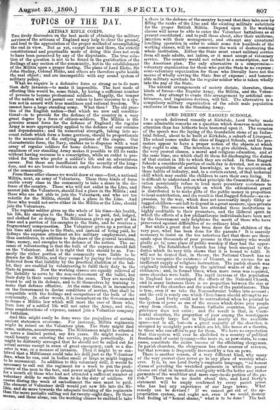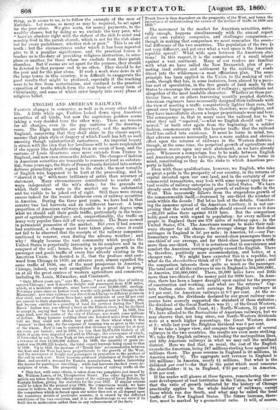LORD DERBY ON RIGGED SCHOOLS.
Ix a speech delivered recently at Kirkdale, Lord Derby made some admirable remarks on a question which deserves much more attention than has hitherto been bestowed upon. it. The occasion of the speech was the laying of the foundation stone of an Indus- trial School, about to be built at Kirkdale a suburb of Liverpool. The school comes under the class of Ragged Schools, and the pro- moters appear to have a proper notion of the objects at which they ought to aim. The intention is to give children, taken from the very poorest classes a moral and religious education, and at the same time, one which shall fit them for discharging the duties of that station in life to which they are called. In these Ragged Schools a considerable portion of each day is devoted, not so much to the acquisition of mental knowledge, as to the acquisition of those habits of industry, and, to a certain extent, of that technical skill which may enable the children to earn their own living. It is difficult to understand on what principle the Committee of Edu- cation persistently refuse to lend more pecuniary assistance to these schools. The principle on which the educational grant is distributed is to make gifts of the public money in proportion to local contribution, and the result is that Ragged Schools—an ex- pression, by the way, which does not necessarily imply filthy or ragged children—are left to depend in a great measure, upon private charity. The success which has attended these institutions is highly creditable to their promoters and the illiberal spirit in which the efforts of a few philanthropic individuals have been met by the Government only heightens the merit of those who have persevered against difficulties of no ordinary kind.
But while a great deal has been done for the children of the very poor, what has been done for the parents ? It is scarcely necessary to insist on the too notorious fact that there are thou- sands upon thousands of poor persons in this country who would gladly go to: some place of public worship if they had the appor- tunity. The Established Church has long been unequal to the duties which its very title shows that it is bound to fulfil. It will not be denied that, in theory, the National Church has no right to recognize the existence of Dissent, as an excuse for an inefficient supply of religious instruction. The parish church was originally intended to supply the :spiritual wants of all the pa- rishioners; and, in former times, when more room was required, more churches were built. The rapid increase of the population in England has outstripped the efforts of the National Church, and in many instances there is no proportion between the size or number of the churches and the number of the parishioners. This is true, even if we take the Nonconformist bodies into account ; and the evil is surely one which Churchmen should attempt to re- medy. Lord Derby could not be contradicted when he pointed to the system of pews as one of the causes which drive poor people away from church. In Roman Catholic countries, this great
grievance does not exist ; and the result is that, in Conti- nental churches, the proportion of poor among the worshippers is extremely large but in England nearly all the available space—not in all, but—in a great majority of the churches, is occupied by unsightly pews which are let, like boxes at a theatre, to those who can afford to pay for them. We have no expectation that this system will ever be abolished in a country of political freedom and of social tyranny.—the more so, as pew-rents, sonic cases, constitute the entire income of the officiating clergyman. In parish churches, the clergyman has other sources of revenue, but that revenue is frequently increased by a tax on pews.
There is another reason, of a very different kind, why many of the very poorest class never go to any place of worship what- ever. It is, to use Lord Derby's emphatic language, "an honest shame of parading the wretched garments in which the poorer classes are clad in immediate contiguity with the better and richer garments of the wealthier and more easy-to-do portion of the pa- rish." There can be no doubt about this, and Lord Derby's statement will be amply confirmed by every parish priest who has had any experience of our large towns. What remedy can be devised ? If we cannot get rid of the ap- propriation system, and ought not, even if we mild, destroy that feeling of "honest shame," what is to be done ? The best
thing, as it seems to us, is to follow the example of the men of Ifirkdale. Let rooms, as many as may be required, be set apart ter the poor alone. We give seats, for money payments, to the wealthy classes. but by doing so we exclude the very poor, who "have an absolute right with the richest of the rich to enter and worship God in the parish church, which is not for the rich alone but for every parishioner, whether rich or poor." This is an old truth ; but the circumstances under which it has been repeated give to it a peculiar significance, and the practical lesson it teaches us is the duty of providing religious instruction, in some place or another, for those whom we exclude from their parish ehnrches. Bat if rooms are set apart for the purpose, they should be devoted to that purpose and to no other. They should be for the poor and for the poor alone. If such a work were done in all the large towns in this country, it is difficult to exaggerate the good. results that might be produced, especially if the teaching were to be free from sectarianism, and confined to the practical exposition of truths which form the real basis of every form of Christianity, and some of which enter largely into every phase of religions belief.



























 Previous page
Previous page